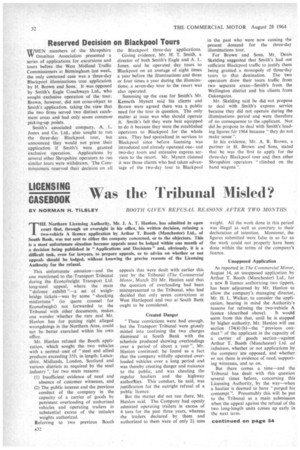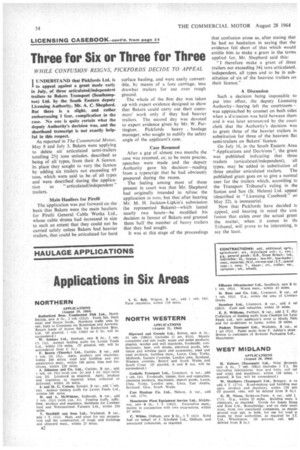Was the Tribunal Misled?
Page 34

Page 36

If you've noticed an error in this article please click here to report it so we can fix it.
BY NORMAN H. TILSLEY BOOTH GIVEN REFUSAL REASONS AFTER TWO MONTHS THE Northern Licensing Authority, Mr. .1. A. T. Hanlon, has admitted in open court that, through an oversight in his office, his written decision, refusing a two-vehicle A licence application by Arthur T. Booth (Manchester) Ltd., of South Bank, was not sent to either the company concerned, or to the objectors. This is a most unfortunate situation because appeals must be lodged within one month of a decision being published in "Applications and Decisions" and, obviously, it is a difficult task, even for lawyers, to prepare appeals, or to advise on whether or not appeals should be lodged, without knowing the precise reasons of the Licensing Authority for the refusal.
This unfortunate omission—and the one mentioned to the Transport Tribunal during the Econofreight Transport Ltd. long-steel appeal, where the main "defence exhibit "—a set of weighbridge tickets—was by some "shocking misfortune (to quote counsel for Econofreight) not forwarded to the Tribunal with other documents, makes one wonder whether the rare zeal Mr. Hanlon has for putting right alleged wrongdoings in the Northern Area, could not be better exercised within his own office.
Mr. Hanlon refused the Booth application. which sought the two vehicles with a normal user of "steel and allied products exceeding 35ft. in length; Lancashire. Midlands, London, Scotland and various districts as required by the steel industry ", for two main reasons: (I) Insufficient evidence of need and absence of customer witnesses, and (2) The public interest and the previous conduct of the company in the capacity of a carrier of goods by persistent overloading of authorized vehicles and operating trailers in substantial excess of the unladen weights authorized.
Referring to two previous Booth
appeals that were dealt with earlier this year by the Tribunal (The Commercial Motor, March 20) Mr. Hanlon said that the question of overloading had been misrepresented to the Tribunal, who had decided that only seven convictions at West Hartlepool and two at South Bank ought to be considered.
Created Danger 'These convictions were bad enough, but the Transport Tribunal were grossly misled into confusing the two charges dismissed at South Bank with the schedule produced showing overloadings over a period of about a year", Mr. Hanlon continued: he found as a fact that the company wilfully operated overloaded vehicles over a long period and was thereby creating danger and nuisance to the public, and was cheating the regular hauliers and the highway authorities. This conduct, he said, was justification for the outright refusal of a public licence.
But the matter did not rest there, Mr. Hanlon said. The Company had openly admitted operating trailers in excess of 4 tons for the past three years, whereas the trailers declared by them and authorized to them were of only 24 tons weight. All the work done in this period was illegal as well as contrary to their declaration of intention. Moreover, the figures submitted were false in so far as the work could not properly have been done within the terms of the company's licence.
Unopposed Application
As reported in The Commercial Motor, August 14, an unopposed application by Arthur T. Booth (Manchester) Ltd., for a new B licence authorizing two tippers, has been adjourned by Mr. Hanlon to allow the company's managing director, Mr. H. L. Walker, to consider the application, bearing in mind the Authority's reasons for refusing the two-vehicle A licence (described above). It would seem from this that, until he is stopped by higher authority, Mr. Hanlon will use section 174(4)(b)—the "previous conduct" of the applicant in the capacity of a carrier of goods section—against Arthur T. Booth (Manchester) Ltd. ad infinitum, whether or not applications by the company are opposed, and whether or not there is evidence of need, supporting witnesses, and so on_
But there comes a time—and the Tribunal has dealt with this question several times before, concerning this Licensing Authority, by the way—when a haulier is deemed to have "purged his contempt ". Presumably this will be put to the Tribunal as a main submission when the appeal against the refusal of the two long-length units comes up early in the next term.
Three for Six or Three for Three
WHILE CONFUSION REIGNS, PICKFORDS DECIDE TO APPEAL I UNDERSTAND that Pickfords Ltd. is I. to appeal against a grant made early in July, of three articulated/independent trailers to Bakers Transport (Southampton) Ltd. by the South Eastern deputy Licensing Authority, Mr. A. C. Shepherd. But there is a slight, and rather embarrassing I fear, complication in the ease. No one is quite certain what the deputy Authority's decision was, and the shorthand transcript is not exactly helpful in this respect.
As reported in The Commercial Motor, May 8 and July 3, Bakers were applying to delete six articulated semi-trailers totalling 25.4tons unladen, described as being of all types, from their A licence. In place they sought to vary the licence by adding six trailers not exceeding 69 tons, which were said to be of all types and were described during the applica
tion as " articulated/independent " trailers.
Main Hauliers for Pirelli The application was put forward on the basis that Bakers were the main hauliers for Pirelli General Cable Works Ltd., whose cable drums had increased in size to such an extent that they could not be carried safely unless Bakers had heavier trailers, that could be articulated for hard surface hauling, and were easily convertible, by means of a fore carriage, into drawbar trailers for use over rough ground.
The whole of the first day was taken up with expert evidence designed to show that Bakers could carry out their customers' work only if they had heavier trailers. The second day was devoted to expert evidence given by Mr. W. Par
tington, Pickfords heavy , haulage manager, who sought to nullify the safety angle of the applicant's case.
Case Resumed After a gap of almost two months the case was resumed, or, to be more precise, speeches were made . and the deputy Authority gave his decision—reading from a typescript that he had obviously prepared during the recess.
The feeling among most of those present in court was that Mr. Shepherd had originally intended to refuse the application in 1010, but that after hearing Mr. M. H. Jackson-Lipkin's submission (he represented Bakers)—which lasted nearly two hours—he modified his decision in favour of Bakers and granted them half the number of heavy trailers that they had sought.
It was at this stage of the proceedings that confusion arose as. after stating that he had no hesitation in saying that the evidence fell short of that which would entitle him to make a grant in the terms applied for, Mr. Shepherd said this: "1 therefore make a grant of three trailers not exceeding 344 tons articulated, independent, all types and to be in substitution of six of the heaviest trailers on their licence."
A Discussion
Such a decision being impossible to put into effect, the deputy Licensing Authority—haying left the courtroom— was approached by counsel on both sides when a dlscussion was held between them and it was later announced by the court clerk that the Authority's decision was to grant three of the heavier trailers in substitution for three of the heaviest flat semi-trailers on Bakers' licence.
On July 16. in the South Eastern Area "Applications and Dec;slons", the grant was published indicating that three trailers (articulated/ independent), all types, may be added in substitution of three smaller articulated trailers. The published grant goes on to give a normal user for the trailers which, according tc the Transport Tribunal's ruling in the Sutton and Son (St. Helens) Ltd. appeal (described in "Licensing Casebook" or May 22), is immaterial.
Now that Pickfords have decided tc appeal, and bearing in mind the confusion that exists over the actual grant the matter, when it comes to thi Tribunal, will prove to be interesting, tt say the least.




















































































































